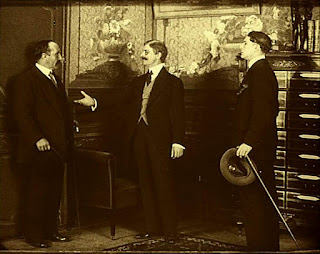
I believe these tales are also known as Tales of 1000 Nights. In ancient dinasty of Sassanidae, lived a great sultan named Schahriar. His kingdom lied from Persia to the borders of China. He was betrayed by his beloved wife and therefore concluded that every women was as wicked as her. So every evening he married a new wife and the next morning had her strangled. The grand vizir, whose task was to provide the sultan a new wife, had 2 beautiful daughters. Scheherazade was the eldest, very beautiful, intelligent, and wise. She thought she had a way to stop the terror, so she asked her father to present her before the sultan. On the wedding night, she asked her sister Dinarzade to accompany her in the chamber. One hour before dawn, Dinarzade was to wake her up and ask her to tell a story. The story, was to be continued in the next day, and this went on and on, and finally the sultan let Scheherazade lived.

This Reader's Digest edition, only contains selected stories from Andrew Lang's The Arabian Nights Entertainments. There are 18 colour illustrations and 13 black and white illustrations by Edmund Dulac, René Bull, H.J. Ford, W.H. Lister, and Monro S. Orr. The binding is strong and good.
In the first chapters, it's very obvious that the tales are continuous. They are tales within tales. It begins with 'The Merchant and The Genie', about a merchant who accidentally kills a genie's son. The genie wants to kill the merchant as a revenge, but then comes 3 old men who each tell the genie a tale, in order to make him change his mind. After that, it continues to the story of The Fisherman. "But, sire," added Scheherazade, "however beautiful are the stories I have just told you, they cannot compare with the story of the fisherman."

The Fisherman is about a fisherman who finds a jar, which contains a genie who has sworn to kill whoever set him free. The fisherman succeeds to trap him back into the jar, and he says this to the genie who asks for mercy: "If I trust myself to you I am afraid you will treat me as a certain Greek king treated the physician, Douban. Listen, and I will tell you." And the tale continues to The Greek King and The Physician, which ends with this sentence: "This vizir [] told King Sinbad that one ought not to believe everything that a mother-in-law says and told him this story." and continues to a tale entitled The Husband and The Parrot, which continues to The Vizir who was Punished, and ends with The Young Kind of The Black Isles.
Next, there are longer tales, some are well-known: Ali Baba and The Forty Thieves, Prince Ahmed and The Fairy, Sinbad The Sailor, The Little Hunchback, The Prince and The Princess, Aladdin and The Wonderful Lamp, The Caliph of Baghdad - The Blind Baba-Abdalla, The Merchant of Baghdad, The Enchanted Horse, and The Jealous Sisters.
All are very enjoyable reading. Scheherazade is a great story teller. My personal favourite maybe (because it's hard to choose) The Little Hunchback, in which a hunchback is accidentally killed and the person who thinks he is responsible for the death tries to put the blame to another person, but when they (for in the end there are several who think they are the killer) see that an innocent man is to be put to death for the crime, each of them confesses that they are the real killer. The story ends with a happy ending, for it turns out none of them is the killer.

















































